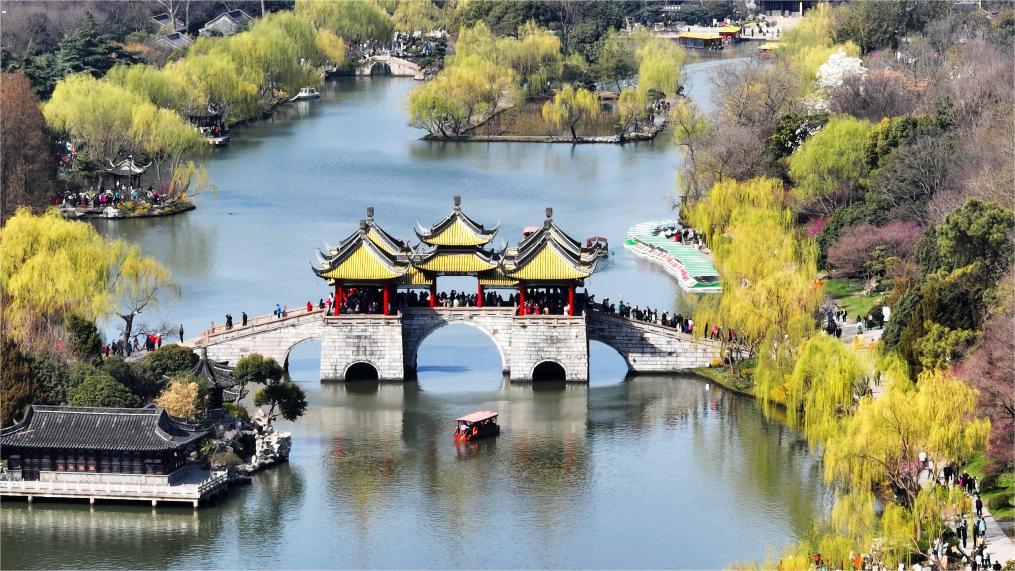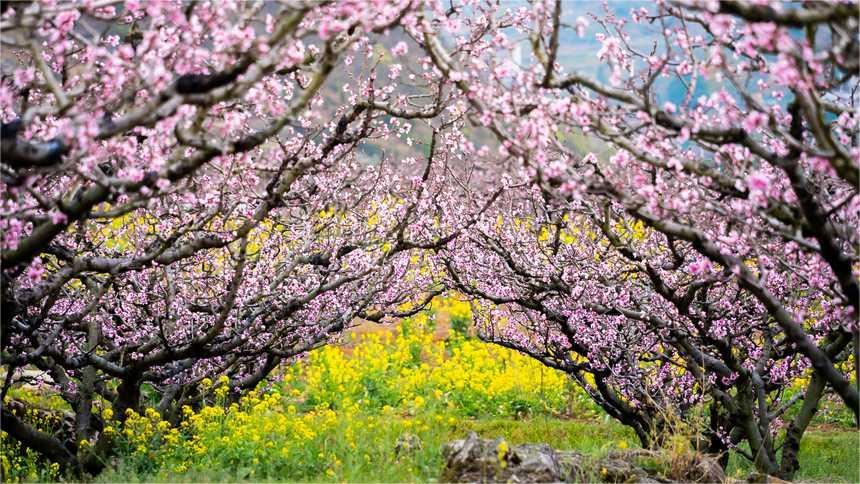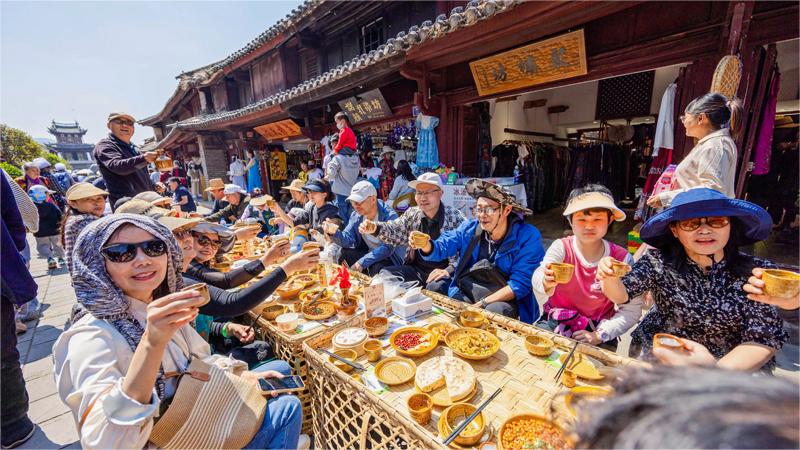Fish farms turn murky waters clear in Liaoning
Editor's Note: As protection of the planet's flora, fauna and resources becomes increasingly important, China Daily is publishing a series of stories to illustrate the country's commitment to safeguarding the natural world.
The once murky waters found in lakes and reservoirs across Northeast China's Liaoning province are being made clear again thanks to the help of a partner found in Mother Nature — fish.
The state-owned Liaoning Water Resource Management Group in 2016 began implementing a plan introduced by the then-ministry of agriculture to establish fish farms in algae-plagued water bodies to improve water quality and provide a secondary source of revenue.
Algal blooms emerge as nitrogen and phosphorus build up in lakes, reservoirs and other slow-moving waters due to agricultural runoff and contamination from untreated urban sewage.
The blooms endanger the ecosystem of freshwater lakes and can cause taste and odor problems in waters used for drinking.
The water management group, which operates 16 reservoirs across Liaoning and supplies nearly 70 percent of the province's water, has long wrestled with algae.
By introducing fish into water bodies, the water resource group is able to control algal blooms, clean up the water and then re-catch the fish to sell on the market once they've reached maturity, bringing in revenue and bolstering the nation's food security.
In recent years, provinces such as Yunnan, Anhui and Shandong, where freshwater lakes are abundant, have also rolled out similar programs.
However, these programs' custodians have warned the process is not as simple as it seems.
"Not all fish can thrive in reservoirs," said Guan Wankai, who oversees the group's operations at Guanyinge Reservoir in Benxi, southeast Liaoning.
Guan said to make the program work, the group has looked to filter-feeding fish including carp and types of catfish, that guzzle particles suspended in the water.
He said the fish in Guanyinge Reservoir are mostly silver and bighead carp.
Citing research data, the official said harvesting a kilogram of carp is equivalent to removing about 20 grams of nitrogen, 1.5 grams of phosphorus and 118 grams of carbon from the water. When calculated by the biomass of algae, 40 kg are eliminated from the water with every kilogram of fish caught.
In a written response to China Daily's request for comment, the group said it had released 7,945 metric tons of carp and other species across Liaoning by last year, and the harvest amounted to 28,100 tons.
In 2023, 4,600 tons of fish were caught, with the group raking in an additional 71 million yuan ($9.86 million), it said.
Double harvest
Local media have hailed the approach as a win-win solution, which realizes the "double harvest" for the ecology and economy.
The group refers to the practice as "green ecological fish farming", meaning no feed or fertilizers are used throughout the fish life cycle.
"The biggest feature of this approach is people release fish and allow them to grow naturally," said Yan Weian, another official working at Guanyinge Reservoir.
Official figures show that 52 percent of the country's freshwater aquaculture areas are lakes and reservoirs, which produce about one-fifth of China's freshwater catch.
These fish, especially those from reservoirs, are commonly referred to as "ecological fish" due to their health benefits.
China is the world's fourth largest organic food producer by growing area, and sales of such food reached 87.7 billion yuan in 2022, according to a report by the State Administration of Market Regulation.
The group said many of its fish products had been certified organic and have proved to be a hit in markets including Beijing, Tianjin and Guangzhou of Guangdong province. The organic status is reviewed every year.
Fish raised in reservoirs, according to the group, are richer in protein and have a lower fat content due to the province's lengthy winter. When caught in spring, the fat stores of the fish have almost depleted, meaning the flesh is firm and chewy.
Carp, the group's signature product, are nutritious containing potassium, sodium and calcium, it said.
Urbanization
March 22 marks the 32nd World Water Day, and the week starting March 22 is China's 37th China Water Week.
Established by the United Nations, World Water Day aims to raise awareness about the global water crisis and the need for access to clean water for all. Each year, the day focuses on a specific aspect of fresh water, such as water scarcity, water pollution or water conservation, in order to promote action and international cooperation to address water-related challenges.
Liaoning's approach is a departure from conventional methods used to handle algal outbreaks such as through costly mechanical removals, or using chemicals including algicides or herbicides.
Algal blooms surged in China as it rapidly industrialized, according to the Ministry of Ecology and Environment.
The expansion of populous urban areas around lakes and reservoirs has in some cases led to sewage discharged untreated, causing eutrophication. Nitrogen, phosphorus and other pollutants from fish farming have also contributed to the process.
A major instance was an algal outbreak in 2007 in Jiangsu province's Taihu Lake, the third largest freshwater lake in China that supplies drinking water to hundreds of thousands of households in the city of Wuxi. The water quality deteriorated so much that it began to smell and could not be used. Bottled water was quickly snapped up in the city despite price gouging.
Liaoning's practice has come on the back of China stepping up its national food security efforts by diversifying its food sources. In 2017, the central authorities urged at the annual rural work conference that officials establish a "macro food perspective" and seek food supplies from outside conventional areas of agriculture. Grassland, forests, the ocean and even microorganisms, are listed as potential food sources to meet the country's growing need for nutritious sustainment.
The push to develop a "macro food perspective" and diversify the country's food sources was reiterated at the most recent central rural work conference held in December.
The group said raising fish in its reservoirs is in line with the central government's directive, and is a newly gained duty in the new era. However, it stressed that environmental protection is the absolute priority, and it will attempt to foster a fish farming business that will not strain the environment or interfere with its main tasks. The group noted it had selected species that live in zones of different depths so that waterborne pollutants are fully utilized and not a single area could become overcrowded.
As the financial outlook of reservoir fish farming brightens, the group has run into new problems such as a rise in illegal fishing due to insufficient monitoring. Some vendors have even passed off inferior quality products as reservoir catches, hurting the reputation of the genuine article.
To make the fish business sustainable, the group has worked with police to combat the illegal fishing. It has also worked with research bodies to introduce new species with higher added value, which makes counterfeits easier to spot while boosting revenue. The group said it is aiming to go beyond 4,000 tons of fish caught a year and increase the annual revenue to no less than 60 million yuan.
"With living standards increasing, consumers now prefer organic fish raised in open waters," the group said.
"Our fish business has a bright future ahead."
Photos
Related Stories
- Leopard coral grouper breeding thrives in S China's Hainan
- Fishermen engage in winter fishing in Zhangshu, E China's Jiangxi
- The enduring taste of sauerkraut amid NE China's evolution
- In pics: floating fish farms in Lhokseumawe, Indonesia
- China's Liaoning sees foreign goods trade exceed 107 bln USD in 2023
- Trams decorated with lights to attract tourists in Dalian, China's Liaoning
Copyright © 2024 People's Daily Online. All Rights Reserved.









